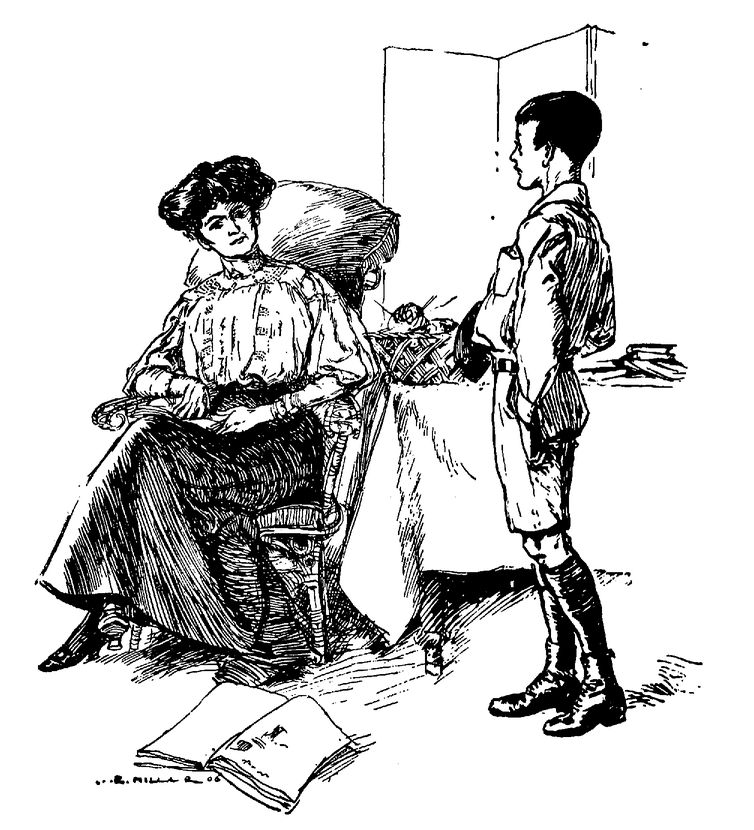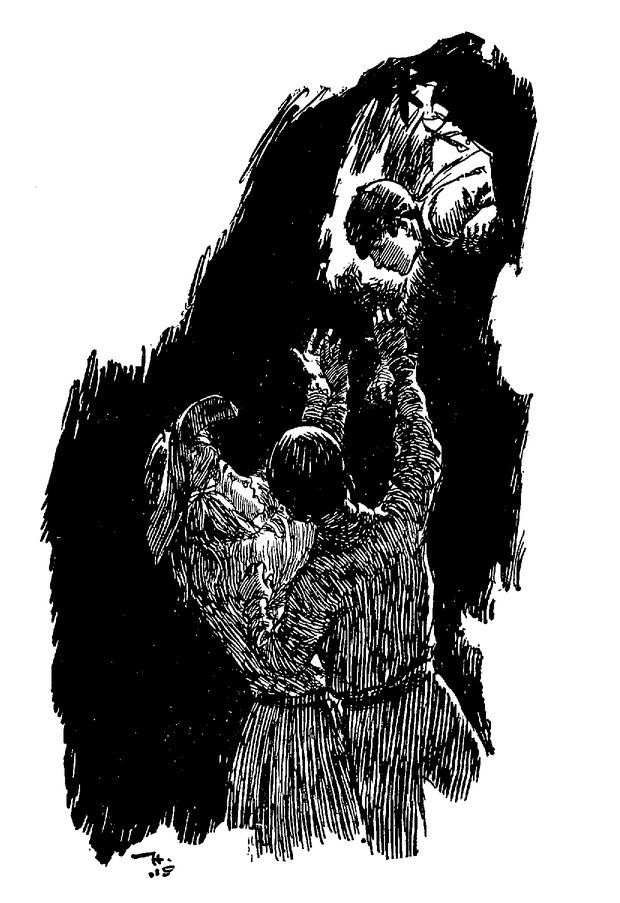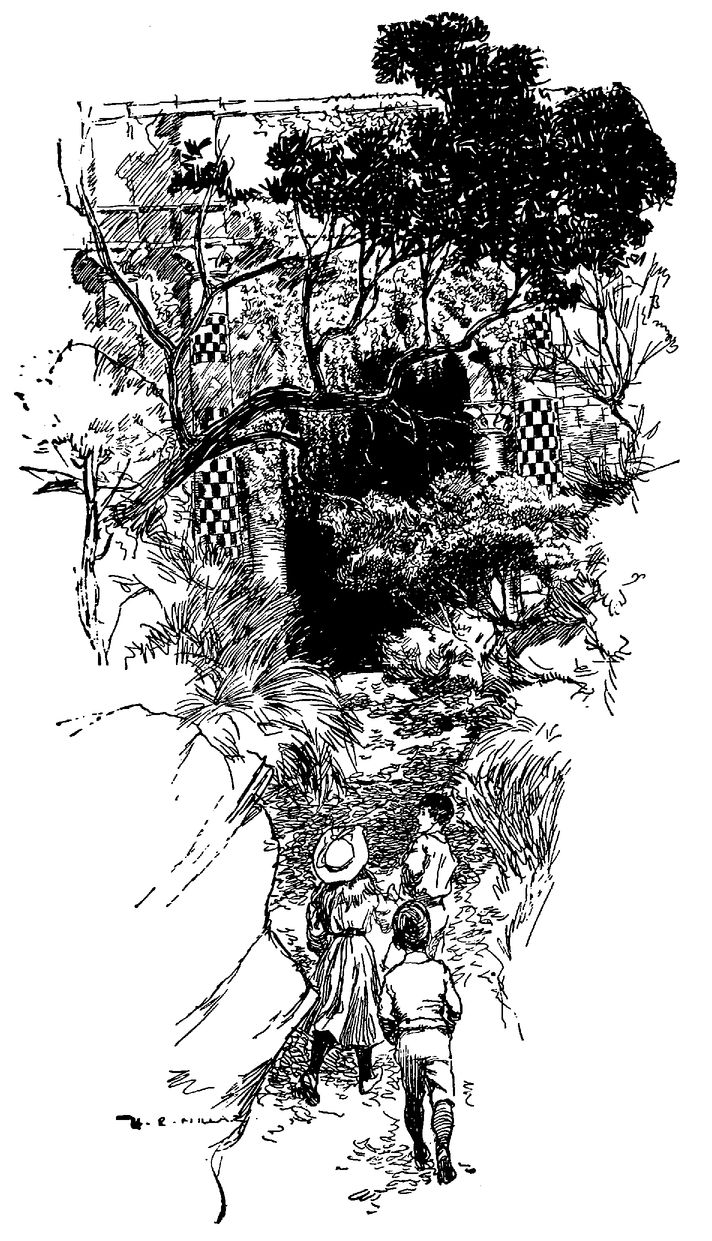Enchanted Castle and Five Children and It (Barnes & Noble Classics Series) (30 page)
Read Enchanted Castle and Five Children and It (Barnes & Noble Classics Series) Online
Authors: Edith Nesbit
“We’ll try,” he said earnestly.
“Can one do anything for you?” asked the French governess kindly.
“Oh, no, thank you,” said Gerald. “We don’t want to give you any trouble at all. And I was thinking it would be less trouble for you if we were to go out into the woods all day tomorrow and take our dinner with us—something cold, you know—so as not to be a trouble to the cook.”
“Little deceiver!” she said

“You are very considerate,” said Mademoiselle coldly. Then Gerald’s eyes smiled; they had a trick of doing this when his lips were quite serious. Mademoiselle caught the twinkle, and she laughed and Gerald laughed too.
“Little deceiver!” she said. “Why not say at once you want to be free of
surveillance,
how you say—overwatching—without pretending it is me you wish to please?”
surveillance,
how you say—overwatching—without pretending it is me you wish to please?”
“You have to be careful with grown-ups,” said Gerald, “but it isn’t all pretence either. We don’t want to trouble you—and we don’t want you to—”
“To trouble you. Eh bien! Your parents, they permit these days at woods?”
“Oh, yes,” said Gerald truthfully.
“Then I will not be more a dragon than the parents. I will forewarn the cook. Are you content?”
“Rather!” said Gerald. “Mademoiselle, you are a dear.”
“A deer?” she repeated—“a stag?”
“No, a—a chérie,”
cl
said Gerald—“a regular A1 chérie. And you shan’t repent it. Is there anything we can do for you—wind your wool, or find your spectacles, or—?”
cl
said Gerald—“a regular A1 chérie. And you shan’t repent it. Is there anything we can do for you—wind your wool, or find your spectacles, or—?”
“He thinks me a grandmother!” said Mademoiselle, laughing more than ever. “Go then, and be not more naughty than you must.”
“Well, what luck?” the others asked.
“It’s all right,” said Gerald indifferently. “I told you it would be. The ingenuous youth won the regard of the foreign governess, who in her youth had been the beauty of her humble village.”
“I don’t believe she ever was. She’s too stern,” said Kathleen.
“Ah!” said Gerald, “that’s only because you don’t know how to manage her. She wasn’t stern with me.”
“I say, what a humbug you are though, aren’t you?” said Jimmy.
“No, I’m a dip—what’s-its-name? Something like an ambassador. Dipsoplomatist—that’s what I am. Anyhow, we’ve got our day, and if we don’t find a cave in it my name’s not Jack Robinson.”
Mademoiselle, less stern than Kathleen had ever seen her, presided at supper, which was bread and treacle spread several hours before, and now harder and drier than any other food you can think of Gerald was very polite in handing her butter and cheese, and pressing her to taste the bread and treacle.
“Bah! it is like sand in the mouth—of a dryness! Is it possible this pleases you?”
“No,” said Gerald, “it is not possible, but it is not polite for boys to make remarks about their food!”
She laughed, but there was no more dried bread and treacle for supper after that.
“How do you do it?” Kathleen whispered admiringly as they said good night.
“Oh, it’s quite easy when you’ve once got a grown-up to see what you’re after. You’ll see, I shall drive her with a rein of darning cotton after this.”
Next morning Gerald got up early and gathered a little bunch of pink carnations from a plant which he found hidden among the marigolds. He tied it up with black cotton and laid it on Mademoiselle’s plate. She smiled and looked quite handsome as she stuck the flowers in her belt.
“Do you think it’s quite decent,” Jimmy asked later—“sort of bribing people to let you do as you like with flowers and things and passing them the salt?”
“It’s not that,” said Kathleen suddenly. “I know what Gerald means, only I never think of the things in time myself. You see, if you want grown-ups to be nice to you the least you can do is to be nice to them and think of little things to please them. I never think of any myself. Jerry does; that’s why all the old ladies like him. It’s not bribery. It’s a sort of honesty—like paying for things.”
“Well, anyway,” said Jimmy, putting away the moral question, “we’ve got a ripping day for the woods.”
They had.
The wide High Street, even at the busy morning hour almost as quiet as a dream-street, lay bathed in sunshine; the leaves shone fresh from last night’s rain, but the road was dry, and in the sunshine the very dust of it sparkled like diamonds. The beautiful old houses, standing stout and strong, looked as though they were basking in the sunshine and enjoying it.
“But are there any woods?” asked Kathleen as they passed the market-place.
“It doesn’t much matter about woods,” said Gerald dreamily, “we’re sure to find
something.
One of the chaps told me his father said when he was a boy there used to be a little cave under the bank in a lane near the Salisbury Road; but he said there was an enchanted castle there too, so perhaps the cave isn’t true either.”
something.
One of the chaps told me his father said when he was a boy there used to be a little cave under the bank in a lane near the Salisbury Road; but he said there was an enchanted castle there too, so perhaps the cave isn’t true either.”
“If we were to get horns,” said Kathleen, “and to blow them very hard all the way, we might find a magic castle.”
“If you’ve got the money to throw away on horns ...” said Jimmy contemptuously.
“Well, I have, as it happens, so there!” said Kathleen. And the horns were bought in a tiny shop with a bulging window full of a tangle of toys and sweets and cucumbers and sour apples.
And the quiet square at the end of the town where the church is, and the houses of the most respectable people, echoed to the sound of horns blown long and loud. But none of the houses turned into enchanted castles.
So they went along the Salisbury Road, which was very hot and dusty, so they agreed to drink one of the bottles of ginger-beer.
“We might as well carry the ginger-beer inside us as inside the bottle,” said Jimmy, “and we can hide the bottle and call for it as we come back.”
Presently they came to a place where the road, as Gerald said, went two ways at once.
“That looks like adventures,” said Kathleen; and they took the right-hand road, and the next time they took a turning it was a lefthand one, so as to be quite fair, Jimmy said, and then a right-hand one and then a left, and so on, till they were completely lost.
“Completely,” said Kathleen; “how jolly!”
And now trees arched overhead, and the banks of the road were high and bushy. The adventurers had long since ceased to blow their horns. It was too tiring to go on doing that, when there was no one to be annoyed by it.
“Oh, kriky!” observed Jimmy suddenly, “let’s sit down a bit and have some of our dinner. We might call it lunch, you know,” he added persuasively.
So they sat down in the hedge and ate the ripe red gooseberries that were to have been their dessert.
And as they sat and rested and wished that their boots did not feel so full of feet, Gerald leaned back against the bushes, and the bushes gave way so that he almost fell over backward. Something had yielded to the pressure of his back, and there was the sound of something heavy that fell.
“Oh, Jimminy!” he remarked, recovering himself suddenly; “there’s something hollow in there—the stone I was leaning against simply went!”
“I wish it was a cave,” said Jimmy; “but of course it isn’t.”
“If we blow the horns perhaps it will be,” said Kathleen, and hastily blew her own.
Gerald reached his hand through the bushes. “I can’t feel anything but air,” he said; “it’s just a hole full of emptiness.” The other two pulled back the bushes. There certainly was a hole in the bank. “I’m going to go in,” observed Gerald.
“Oh, don’t!” said his sister. “I wish you wouldn’t. Suppose there were snakes!”
“Not likely,” said Gerald, but he leaned forward and struck a match. “It is a cave!” he cried, and put his knee on the mossy stone he had been sitting on, scrambled over it, and disappeared.
A breathless pause followed.
“You all right?” asked Jimmy.
“Yes; come on. You’d better come feet first—there’s a bit of a drop.”
“I’ll go next,” said Kathleen, and went—feet first, as advised. The feet waved wildly in the air.
“Look out!” said Gerald in the dark; “you’ll have my eye out. Put your feet down, girl, not up. It’s no use trying to fly here—there’s no room.
He helped her by pulling her feet forcibly down and then lifting her under the arms. She felt rustling dry leaves under her boots, and stood ready to receive Jimmy, who came in head first, like one diving into an unknown sea.
“It is a cave,” said Kathleen.
“The young explorers,” explained Gerald, blocking up the hole of entrance with his shoulders, “dazzled at first by the darkness of the cave, could see nothing.”
“Darkness doesn’t dazzle,” said Jimmy.
“I wish we’d got a candle,” said Kathleen.
“Yes, it does,” Gerald contradicted—“could see nothing. But their dauntless leader, whose eyes had grown used to the dark while the clumsy forms of the others were bunging up the entrance, had made a discovery.”
“Oh, what!” Both the others were used to Gerald’s way of telling a story while he acted it, but they did sometimes wish that he didn’t talk quite so long and so like a book in moments of excitement.
Jimmy came in head first

“He did not reveal the dread secret to his faithful followers till one and all had given him their word of honour to be calm.”
“We’ll be calm all right,” said Jimmy impatiently.
“Well, then,” said Gerald, ceasing suddenly to be a book and becoming a boy, “there’s a light over there—look behind you!”
They looked. And there was. A faint greyness on the brown walls of the cave, and a brighter greyness cut off sharply by a dark line, showed that round a turning or angle of the cave there was daylight.
“Attention!” said Gerald; at least, that was what he meant, though what he said was “ ’Shun!” as becomes the son of a soldier. The others mechanically obeyed.
“You will remain at attention till I give the word ‘Slow march!’ on which you will advance cautiously in open order, following your hero leader, taking care not to tread on the dead and wounded.”
“I wish you wouldn’t! said Kathleen.
“There aren’t any,” said Jimmy, feeling for her hand in the dark; “he only means, take care not to tumble over stones and things.”
Here he found her hand, and she screamed.
“It’s only me,” said Jimmy. “I thought you’d like me to hold it. But you’re just like a girl.”
Their eyes had now begun to get accustomed to the darkness, and all could see that they were in a rough stone cave, that went straight on for about three or four yards and then turned sharply to the right.
“Death or victory!” remarked Gerald. “Now, then—Slow march! ”
He advanced carefully, picking his way among the loose earth and stones that were the floor of the cave. “A sail, a sail!” he cried, as he turned the corner.
“How splendid!” Kathleen drew a long breath as she came out into the sunshine.
“I don’t see any sail,” said Jimmy, following.
The narrow passage ended in a round arch all fringed with ferns and creepers. They passed through the arch into a deep, narrow gully whose banks were of stones, moss-covered; and in the crannies grew more ferns and long grasses. Trees growing on the top of the bank arched across, and the sunlight came through in changing patches of brightness, turning the gully to a roofed corridor of goldy-green. The path, which was of greeny-grey flagstones where heaps of leaves had drifted, sloped steeply down, and at the end of it was another round arch, quite dark inside, above which rose rocks and grass and bushes.
“It’s like the outside of a railway tunnel,” said James.
“It’s the entrance to the enchanted castle,” said Kathleen. “Let’s blow the horns.”
“Dry up!” said Gerald. “The bold Captain, reproving the silly chatter of his subordinates—”
“It’s
the entrance to the enchanted castle”
the entrance to the enchanted castle”

Other books
Peril at Granite Peak by Franklin W. Dixon
Afterlife by Merrie Destefano
The Alpine Yeoman by Mary Daheim
The Gaze by Elif Shafak
Baby Breakout by Childs, Lisa
A Personal Matter by Kenzaburo Oe
The King Must Die (The Isabella Books) by Sasson, N. Gemini
KW09b:Chickens by Laurence Shames
Eternal Love by Fevrier, Jessika, du Lys, Cerys
Take a Chance on Me by Vanessa Devereaux